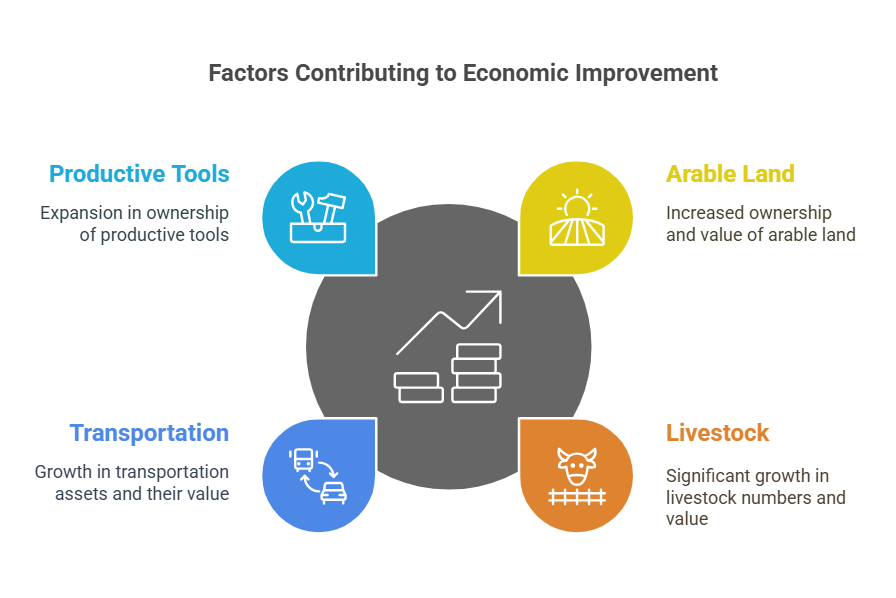
The latest analysis of productive asset ownership between the baseline and endline assessments highlights a significant improvement in household investments across various income-generating resources. These findings suggest a positive shift in economic conditions, enabling families to invest in assets that contribute to their long-term stability and financial well-being.
Expanding Land Ownership and Access
At the baseline, no households reported ownership of arable or mortgaged land. However, by the endline, 3 households had acquired arable land worth BDT 60,000, and 25 households had secured mortgaged land valued at BDT 55,400. This increase demonstrates improved access to land assets, which are crucial for agricultural activities and sustainable livelihood generation.
Growth in Livestock Ownership
Livestock is a key income source for many households, and the study shows substantial growth in ownership. Goat ownership rose from zero at baseline to 173 households at the endline, with a total asset value of BDT 11,260.12. Similarly, cow ownership increased to 119 households, with a significant asset value of BDT 39,491.60.
Additionally, poultry farming saw a rise in ownership. The number of households owning chickens increased from 78 to 174, with the total asset value increasing from BDT 346 to BDT 2,268.02. Duck ownership also expanded, with 151 households reporting ownership at the endline compared to 91 at the baseline, and the total asset value increasing from BDT 645 to BDT 2,283.80. These trends indicate a growing preference for livestock investments as a means of economic empowerment.
Investments in Transportation and Equipment
Households have also made strategic investments in productive tools and transportation, further strengthening their economic resilience. Rickshaw and van ownership grew from 5 to 9 households, with total asset value rising from BDT 2,375 to BDT 41,111.11, reflecting the increasing importance of transport-based livelihoods.
Similarly, sewing machine ownership saw an increase from 5 to 21 households, with the value rising from BDT 1,600 to BDT 4,071.43. This growth indicates an expansion of home-based or small-scale entrepreneurship opportunities. Additionally, agricultural machinery ownership grew significantly from just 1 household at baseline to 112 at the endline, showcasing an increased focus on mechanized farming and enhanced productivity.
Implications for Economic Development
The substantial growth in productive asset ownership across different sectors highlights a positive trajectory toward economic stability and self-sufficiency for households. Investments in land, livestock, transportation, and equipment suggest that families are now more capable of generating income and sustaining their livelihoods over time.
ART Lab remains committed to conducting high-quality research that informs evidence-based interventions aimed at enhancing household resilience and economic opportunities. These findings underscore the importance of continued support for programs that empower communities to build sustainable livelihoods.
Stay connected with ART Lab for more insights and research updates!
#EconomicGrowth #LivelihoodDevelopment #ARTLabResearch

